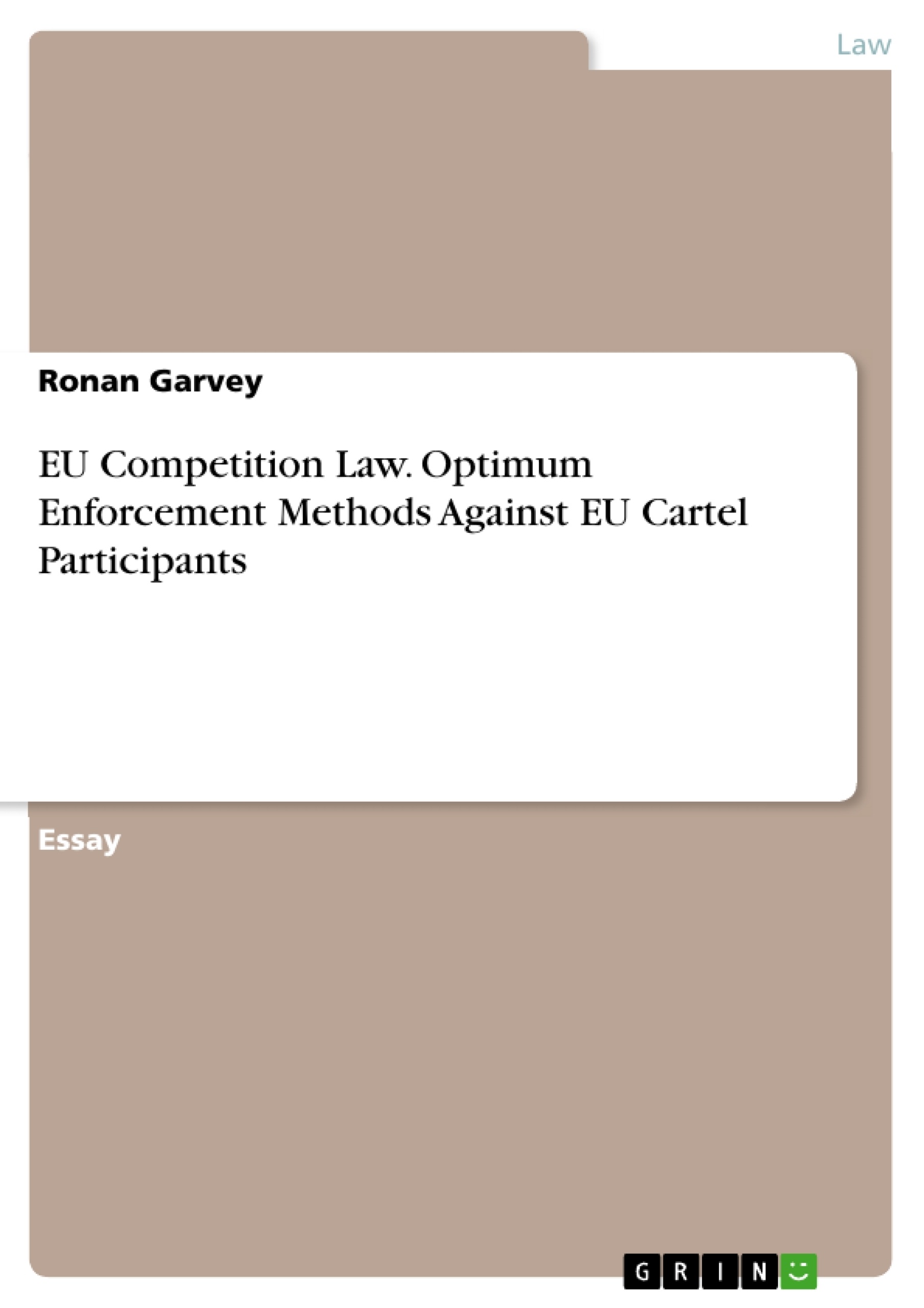This paper is concerned with optimising the enforcement of European Union Competition Law against cartels participants.
A critique of Directive 2014/104 and its main shortcomings will begin this paper. Investigation then launched into role of national competition authorities in the Union, arguing that enhanced member state cooperation and full transposition of draft Directive 2019/1 (ECN+) will deter cartel activity. Final point concerns individual liability against the company agents behind cartels, how corporate fines imposed by European Commission fail to deter individuals against continued cartel participation.
Inhaltsverzeichnis (Table of Contents)
- Introduction
- EU Private Enforcement: David & Goliath?
- Current Law
- Hot Topic: Directive 2014/104
- Collective Redress & ADR: Patching Holes
- Harmony Required: EU Public Enforcement
- 2019: Cracks in the NCA Pavement
- ECN+ Directive: New Rulebook
- NCA Optimisation Requires Unified Union
- Cartels: Promoting Individual Liability
- Trimming Weeds, Pulling Roots
- Conclusion
Zielsetzung und Themenschwerpunkte (Objectives and Key Themes)
This paper analyzes the enforcement of European Union Competition Law against cartel participants, focusing on optimizing enforcement methods. The paper critiques Directive 2014/104 and its limitations, examines the role of national competition authorities in the Union, and discusses the importance of individual liability against company agents involved in cartel activities.
- Critique of Directive 2014/104 and its shortcomings
- Role of national competition authorities in EU competition law enforcement
- Importance of member state cooperation and full transposition of draft Directive 2019/1 (ECN+)
- Promoting individual liability against company agents involved in cartels
- Effectiveness of corporate fines in deterring individuals from cartel participation
Zusammenfassung der Kapitel (Chapter Summaries)
- Introduction: This chapter introduces the topic of cartel arrangements and the European Commission's enforcement policy based on deterrence. It argues for a revision of European antitrust enforcement due to cartels' adaptability.
- EU Private Enforcement: David & Goliath?: This chapter examines the right to recover damages for private parties for breaches of EU Competition rules, focusing on Directive 2014/104. It discusses the Directive's impact on burden of proof and information asymmetry, as well as its limitations regarding indirect damages and collective redress.
- Harmony Required: EU Public Enforcement: This chapter explores the role of national competition authorities in EU competition law enforcement, emphasizing the need for enhanced member state cooperation and full transposition of draft Directive 2019/1 (ECN+). It argues that these measures will deter cartel activity.
- Cartels: Promoting Individual Liability: This chapter examines the importance of individual liability against company agents involved in cartels, arguing that corporate fines are insufficient to deter individuals from participating in cartel activities.
Schlüsselwörter (Keywords)
Key terms and concepts explored in this work include EU Competition Law, cartel enforcement, Directive 2014/104, national competition authorities, individual liability, collective redress, deterrence, and the effectiveness of European Union competition law. The paper analyzes the interplay of public and private enforcement mechanisms, highlighting the need for a unified approach to optimize enforcement and deter cartel activities within the European Union.
Frequently Asked Questions
What is the main objective of Directive 2014/104?
The directive aims to facilitate private enforcement of competition law by making it easier for victims of cartels to sue for damages in national courts.
What are the shortcomings of current EU private enforcement?
Shortcomings include information asymmetry, difficulties in proving indirect damages, and the lack of a unified collective redress (class action) mechanism across all member states.
What is the ECN+ Directive (2019/1)?
The ECN+ Directive is designed to empower national competition authorities (NCAs) to be more effective enforcers by ensuring they have the necessary resources, independence, and fining powers.
Why is individual liability important in cartel cases?
Corporate fines often fail to deter individuals. Holding the specific agents or executives behind the cartel personally liable could provide a much stronger deterrent effect.
How does the "David & Goliath" metaphor apply to competition law?
It describes the struggle of small private parties or consumers (David) trying to claim damages from massive, well-resourced multinational corporations (Goliath) that participated in a cartel.
- Quote paper
- Ronan Garvey (Author), 2019, EU Competition Law. Optimum Enforcement Methods Against EU Cartel Participants, Munich, GRIN Verlag, https://www.grin.com/document/544537



